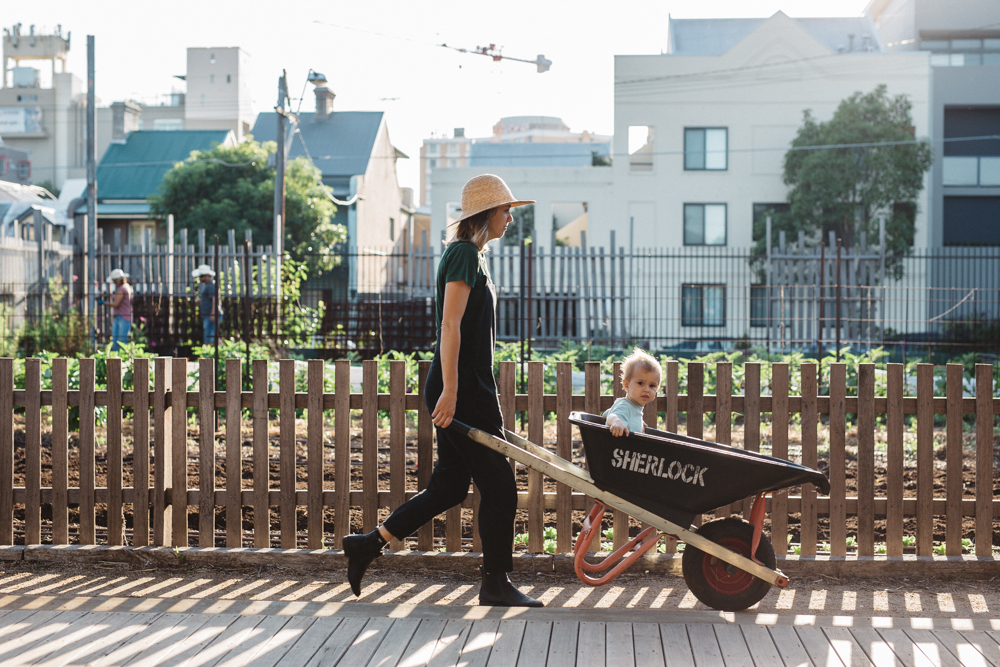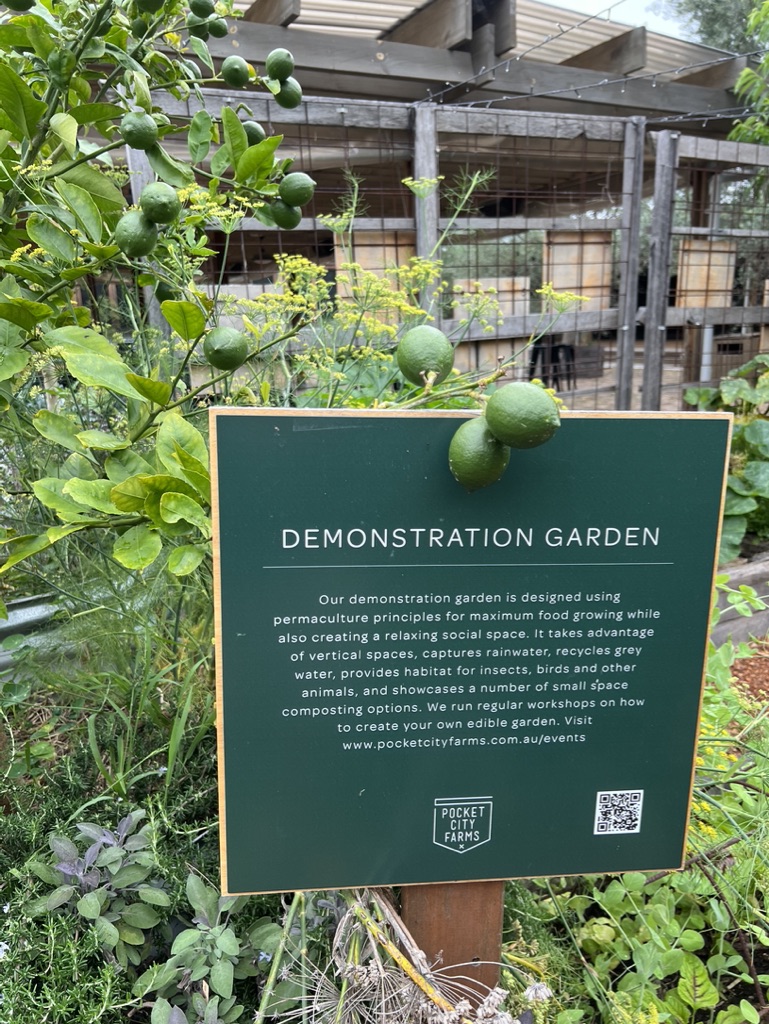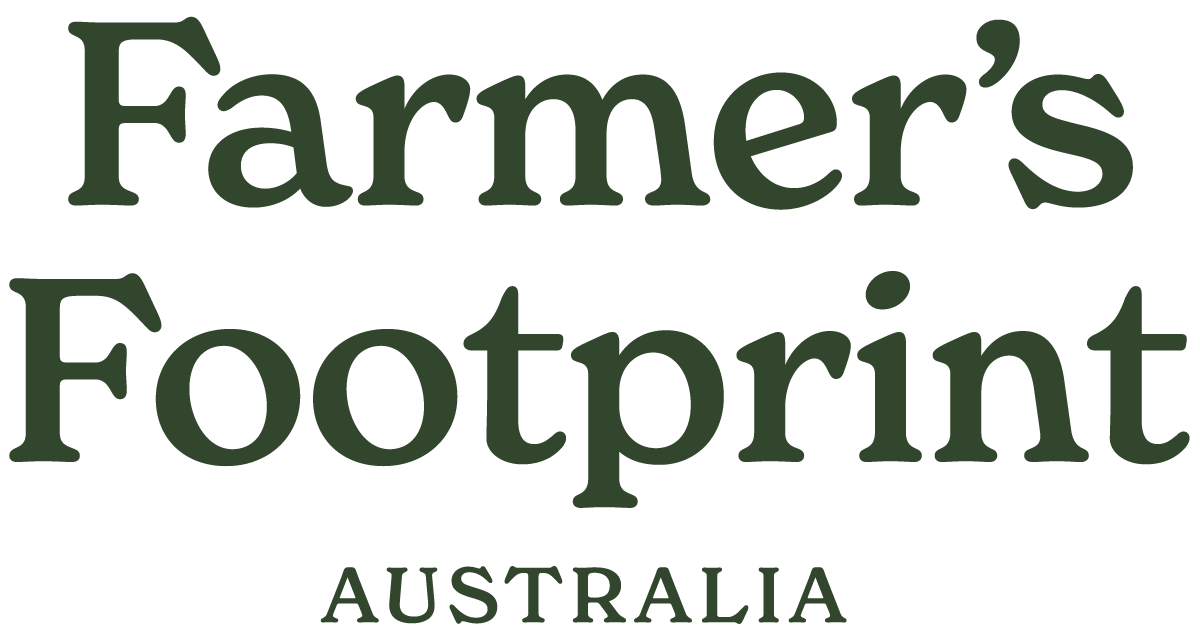Farm Yarns
Pocket City Farms
Gadigal Country, Australia
Our vision is to create a world where all communities are connected through fair access to food.
Urban farming and its multi-dimensional benefits holds the key to increasing food security in our metropolitan areas
When we say the word farm, the last thing you probably picture is a 48m square plot of concrete ringed on each side by highrise buildings, but that’s exactly the type of farm we’re talking about when we mention Pocket City Farms. As the name suggests, this agricultural oasis exists on a small pocket of unutilised urban land and is providing the community of Camperdown and beyond with an inspiring example of what regenerative agriculture can look like in a non-rural setting. Urban farming and its multi-dimensional benefits holds the key to increasing food security in our metropolitan areas and through PCF’s programs, young farmers – in both age and experience – are being shown the possibilities of a career in urban ag.
How was the idea of Pocket City Farms (PCF) conceived and what steps were involved in its launch?
PCF founders Emma and Zag were looking for a space in Sydney to showcase urban agriculture and reconnect people with how their food is grown and where it comes from. They thought they would end up on a rooftop somewhere but to their delight came across the old Camperdown Bowls club. A crowdfunding campaign kicked off the farm and after a year of work preparing the soil (soil testing, solarising and removing the old bowling green) the first crops went in and the farm launched in June 2016. (This is the very short version!! Add in a LOT of blood, sweat, tears and countless volunteer hours)
What is the main function of your organisation and who does it serve?
Pocket City Farms is based around three pillars:
· Fair Food: Food that’s good for the people who grow it (no chemicals, award wages), good for the people who eat it (no chemicals, nutrient dense, local and fresh, available to all) and good for the planet (we grow using regenerative agriculture practices)
· Education: Excursions for school groups focused on soil, food security and all things hands-on farming. Team retreats program for businesses and organisations including education about PCF, regenerative ag and other related topics.
· Community: We run a number of community programs with our weekly farm volunteering, weekly compost carers program, monthly food forest volunteers program, a monthly evening working bee and community meal (during daylight savings) and other community workshops and events.
What role does PCF play in food security and why is it important?
As our farm is really small, we know we can’t contribute a great deal to food security, but as an education and demonstration site we can showcase what can be done on a small urban scale and share what we have learned along the way to inspire others . We have an honesty stall which helps provide access to local fair food and allows us to do our small part to contribute to food security. We’d love to inspire others to farm in the city and believe the cumulative impact of a heap of small farms would really start to make an impact on food security.
“We can showcase what can be done on a small urban scale and share what we have learned along the way to inspire others.”
What has been an unexpected positive outcome of running an urban farm?
Without a doubt it’s the community that we are a part of. Food is a great connector and the people we encounter through selling produce, running workshops and volunteering sessions keep us enthused, smiling and leaping out of bed in the morning to get to work!
What has been the greatest challenge of running an urban farm?
For our current site the greatest challenge is the space we have available. At 1200m2 it’s a very small farm. Most of our income is through our education programs, not produce sales. COVID was also a challenge with a complete staff turnover and most of our programs put on hold. From a broader perspective, not having food security as a priority of our government is a big challenge.
How do you interpret regenerative agriculture and do these principles differ when applied in an urban vs regional context?
For us at PCF, regenerative agriculture means our farming practices leave the land in better condition than when we found it. Taking an old bowling green and turning it into productive, healthy and well-balanced soil has been challenging, but we are lifelong learners and always embracing new ideas. We have a great partnership with Sydney Uni’s soil lab and are currently doing trials of a 26 species multi-covercrop to improve the soil on site. We practice crop rotation and are working to surround the market garden with diversity and perennial plants.
For us this is a chance to showcase some of the regenerative agriculture practices farmers are practicing in regional areas on a very small urban scale, and teach our community about the importance of regenerative ag.
What does diversity mean in your organisation?
Diversity is really important to us at PCF – both for our people and our crops! Our staff and board members represent a diversity of age, backgrounds and genders. Like diversity in agriculture these differences make us stronger, with more connections and ideas.
Diversity is also important in the crops we grow, we aren’t a monoculture farm, we grow with the seasons, grow heirloom varieties, practice integrated pest management and crop rotation.
“Like diversity in agriculture … differences make us stronger, with more connections and ideas.”
What is PCF’s strategy for financial sustainability post-Sydney’s lockdown restrictions? How much of that strategy relies on government and community support?
Between COVID lockdowns we ran a successful crowdfunding campaign and raised 20k thanks to our very generous community. Following the most recent lockdown we were very conservative with our budgeting and have been thrilled our education programs with both schools and business teams have returned stronger than ever. We generate 85% of our income from trade and the remaining 15% is from fundraising and grants.
What has your experience been with Sydney City incentivising initiatives around things like composting local food waste and recycling grey water? How can urban farms benefit from such incentives?
We have a small grant from Inner West council to support our compost program, aside from that we haven’t received any assistance/incentives to compost local food waste or recycle greywater.
We have a small DIY bathtub reed bed to filter greywater on site, we’d love to see a city wide initiative to filter greywater as we have the restaurant on site generating plenty of greywater. We have 50,000L of rainwater storage but in dry times do revert to town water, so having access to treated greywater would be a real asset.

There are a lot of studies being done into the benefits of recognising our place as part of nature, not separate from it. We love being part of this reconnection. It’s a place to slow down and care for people and planet.
What role do young farmers play in urban food systems and how do you engage with them in your social enterprise?
We believe young farmers (both in age and those who are new to farming at any age) are the future of urban agriculture. We can’t have urban farms everywhere by 2030 if we don’t have people trained to run them. That’s why in 2022 we launched a Farm Incubator program where two young farmers are provided with a day a week of paid employment to learn the full range of urban farming skills across all seasons.
What part has mental health played in your business?
The founders and myself have experienced the burnout that is often associated with startups. We are really passionate about caring for people and that includes ourselves and our team. We also want to share the work we have done so that others can short circuit some of the common start-up mistakes and hopefully avoid this burnout.
We are aware that our farm is a place where people experiencing mental health issues may come to reconnect with nature, and get their hands in the soil and care for plants. There are a lot of studies being done into the benefits of recognising our place as part of nature, not separate from it. We love being part of this reconnection. It’s a place to slow down and care for people and planet.
How do you measure your success and/or your impact?
We have an annual report each year that measures:
- Tonnes of food grown
- Tonnes of waste turned into compost
- Number of volunteers
- Number of schools students who visit on excursions
- Number of corporate teams who volunteer
What do you see for the future of urban agriculture?
Our vision for 2030 is to see urban farms like ours everywhere in our cities. We can provide for much of our needs for fresh food in our cities and not only will this help address food security, be delicious and nutritious, it can also help to increase urban greening and increase community connection.
For those interested in participating in Sydney’s urban food system, what resources do you recommend or first steps that can be taken to become involved?
Volunteer! With PCF, with a community garden, with a city farm, with Permablitz. There’s a role for everyone and you will meet wonderful people. If you are looking for paid employment most farms we know tend to recruit from their pool of wonderful volunteers.
What is one message that you would like to see more widely received and embraced by communities in regards to their food?
Eat local and seasonally whenever possible!

Connect and support Pocket City Farm
Pocket City Farms’ vision is to create a world where all communities are connected through fair access to food. For people who believe that everyone deserves access to local, nutritious food, pocket city farms is an urban education & community hub that promotes sustainability, regenerative agriculture and fair food to communities, schools and business so everyone can feel empowered to protect the environment and tackle climate change.
Support empowered storytelling
Your support helps us accelerate the transition to a regenerative farming future.
Follow on Socials
See what’s going on at
Woodstock Flour.
Learn More
Find out more about Pocket City Farm on their website.
